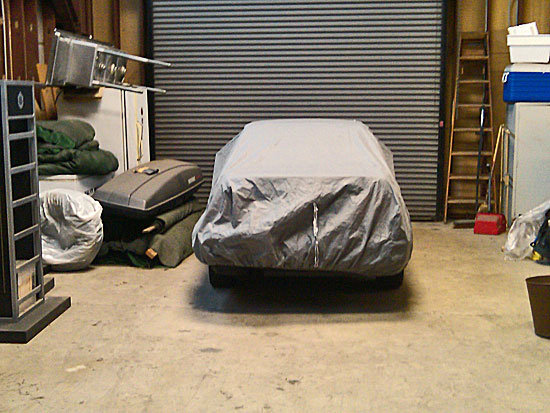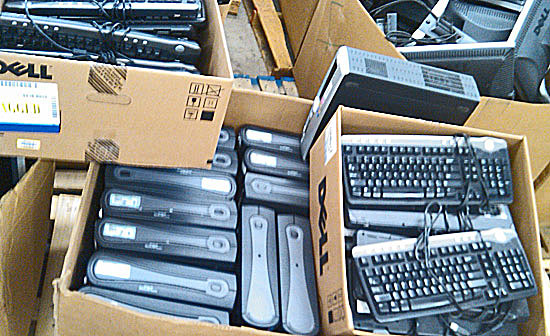E-stockpile found at assessor’s office
May 3, 2012

Assessor's equipment shared space in this storage facility with the landlord's car, bikes and mattresses.
As Los Angeles County was tightening its belt in recent years, its assessor’s office was sitting on a cache of more than a half-million dollars’ worth of brand-new electronics equipment it had stockpiled but never used, a newly-released county audit found.
The auditors discovered some $654,000 worth of never-used equipment, ranging from laptops to laser jet printers, languishing in storage at the Hall of Administration after it was purchased between fiscal years 2001-2 and 2009-10.
“A lot of the equipment was still brand-new, still sealed with the original vendor tape,” said David Aldava, an intermediate accountant-auditor who was part of the team that looked into technology in the assessor’s office.
Aldava’s team also made another unusual discovery: The department had improperly stashed pallets loaded with other computers, printers and tech equipment—some still functioning, some headed to the junk pile—in an unlocked, leased storage facility in Signal Hill, where the county-owned equipment shared space with the landlord’s car, bicycles, refrigerators, mattresses and even a bar sign or two.
The equipment ended up in the storage facility—next to the assessor’s South District office—after employees initially told auditors that the department had no surplus electronics. Eventually, though, the staff “told us that they had previously moved the surplus items from other locations to the storage building in an attempt to hide the equipment from us,” according to an April 13 report from Auditor-Controller Wendy Watanabe.
In a response to the audit filed last month, the department concurred with virtually all of the auditor’s 25 recommendations, most aimed at tightening accountability, record-keeping and security and ensuring that IT equipment is purchased only when needed.
Assessor’s spokesman Louis Reyes said the office is “fully cooperating” in correcting problems uncovered in the audit. “The assessor wants to address these concerns fully,” he said.
Assessor John R. Noguez was elected in November, 2010, and was not in charge during the period in which the new equipment was stockpiled, Reyes noted.
The audit comes as a separate, broader review, ordered by the Board of Supervisors, is underway to examine how the assessor’s office operates across the board. The office has come under fire for allegedly granting preferential treatment to some property owners. Noguez also shocked the supervisors recently when he disclosed a large, unprecedented disparity in property tax projections that could leave the county with a $50 million hole in its budget.
The technology audit, conducted last year and provided to the Board of Supervisors last month, offered its own set of unexpected discoveries.
“This warehouse issue really took us by surprise,” Watanabe said—especially when employees initially refused to let the auditors into the Signal Hill facility, claiming it would take a month to reach the landlord and get his permission for access. “That really piqued our interest.”
It turned out that an effort was underway, apparently, to thwart auditors from discovering an abundance of surplus equipment, which is not allowed under county policy. “They started to dump everything to Signal Hill…We finally did get in and saw stacks and stacks of used computers,” Watanabe said. “They didn’t want us to see it, to cover up that they’d initially lied.”
Even as the used computer equipment was piling up, the department was also acquiring the stacks of new and unneeded electronics—apparently part of a use-it-or-lose strategy of spending IT funds at the end of fiscal years rather than allowing unspent money to revert to the Chief Executive Office’s overall county budget, the audit found.
Beyond the cost of the equipment itself, the department overpaid by not waiting to buy the items until they were actually needed. Because technology prices tend to decrease over time, the assessor’s office ended up paying at least $93,000 more than it should have, the audit found.
Despite the huge build-up in excess tech equipment being stored, the assessor’s office still had plenty of electronic devices to go around, it appears. The audit found that 324 of the department’s 1,425 employees had at least two computers assigned to them—and 57 had three or more.
“To us, this is just ridiculous,” Watanabe said. “There’s really no business reason to justify why someone would have three or more computers.”
The employees themselves admitted as much to county auditors when asked about those second or third computers.
“Oh, yeah, it’s just sitting in my trunk,” some said when questioned about laptops they’d been issued, according to Watanabe.
Having an unused laptop lying around the house or car has hidden costs, too, Watanabe said, since the county pays virtual network fees of $600 a year for each employee who logs onto the network from outside the office—whether a device is being used or not.
Then there were security lapses. The audit said that the assessor’s department disposed of some surplus equipment without first erasing county information from the devices’ hard drives. It also found that 22% of the department’s computers didn’t have any working anti-virus protection.
Although Watanabe said no fraud was uncovered, the audit found a system of lax controls and a cavalier attitude toward safeguarding county property.
As for the surplus devices stashed in Signal Hill, those have all been junked or donated since the audit, or will be soon, according to the department. And employees in the assessor’s office have begun working their way through that unused stockpile of new equipment.
Posted /3/12













 405 bridge work causes a stink
405 bridge work causes a stink
